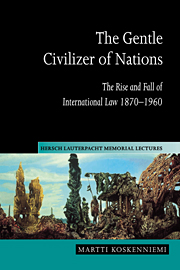Book contents
- Frontmatter
- Contents
- Preface
- List of abbreviations
- Introduction
- 1 “The legal conscience of the civilized world”
- 2 Sovereignty: a gift of civilization: international lawyers and imperialism, 1870–1914
- 3 International law as philosophy: Germany 1871–1933
- 4 International law as sociology: French “solidarism” 1871–1950
- 5 Lauterpacht: the Victorian tradition in international law
- 6 Out of Europe: Carl Schmitt, Hans Morgenthau, and the turn to “international relations”
- Epilogue
- Bibliography
- Index
Epilogue
Published online by Cambridge University Press: 06 July 2009
- Frontmatter
- Contents
- Preface
- List of abbreviations
- Introduction
- 1 “The legal conscience of the civilized world”
- 2 Sovereignty: a gift of civilization: international lawyers and imperialism, 1870–1914
- 3 International law as philosophy: Germany 1871–1933
- 4 International law as sociology: French “solidarism” 1871–1950
- 5 Lauterpacht: the Victorian tradition in international law
- 6 Out of Europe: Carl Schmitt, Hans Morgenthau, and the turn to “international relations”
- Epilogue
- Bibliography
- Index
Summary
There once was a professional gentleman, a barrister who divided his leisure between educating his two sons and furthering the welfare of his people. As he grew older, he saw progress divide its fruit very unevenly around himself. On the one hand, it offered marvellous opportunities for political liberation and personal autonomy; on the other hand it undermined familiar truths and traditions. The virtues of character that had seemed such reliable guides for personal and public lives – charity, reasonableness, courage in the face of adversity – were increasingly ridiculed as the symbols of the corruption of an ancient world.
He decided to learn philosophy and the new sciences of society so as to understand what tradition and experience had failed to teach him. Why were people prepared to go to such lengths in defense of extreme views on matters that had earlier been thought to have been regulated by reason and good sense? He did not precisely wish to become a philosopher or a sociologist but hoped to find intellectual reassurance and perhaps a more efficient platform from which to continue his civilizing activities.
As the sons grew up, they learned that none of this had really worked. The father had to quit his welfare activities, partly because they seemed to have no effect on his clients who were either joining extremist causes or sinking deeper into apathy, partly because they threatened his own livelihood. In an increasingly difficult economic situation, he retired a poor man.
- Type
- Chapter
- Information
- The Gentle Civilizer of NationsThe Rise and Fall of International Law 1870–1960, pp. 510 - 517Publisher: Cambridge University PressPrint publication year: 2001

